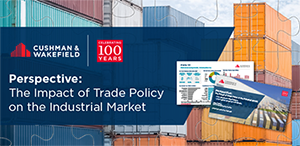President Donald Trump's focus on curbing the trade deficit by bolstering U.S. exports and reducing imports could drive policy changes that may alter industrial real estate markets throughout the U.S., Cushman & Wakefield reported in logistics and industrial research briefing released recently.
 However, the report concludes that a trade war with China or U.S. withdrawal from NAFTA remain unlikely. “President Trump says he believes in ‘free trade but also fair trade,' and as policy details emerge, companies will start looking at their supply chain networks to determine the impact on operating costs,” said Jason Tolliver, head of Industrial Research, Americas at Cushman & Wakefield. “The importance of China, Mexico and Canada as export partners makes withdrawal from the North American Free Trade Agreement or a trade war with China unlikely scenarios.”
However, the report concludes that a trade war with China or U.S. withdrawal from NAFTA remain unlikely. “President Trump says he believes in ‘free trade but also fair trade,' and as policy details emerge, companies will start looking at their supply chain networks to determine the impact on operating costs,” said Jason Tolliver, head of Industrial Research, Americas at Cushman & Wakefield. “The importance of China, Mexico and Canada as export partners makes withdrawal from the North American Free Trade Agreement or a trade war with China unlikely scenarios.”
The U.S. is engaged in complicated trade obligations with 20 countries through 14 free trade agreements. Free trade partners account for nearly 70 percent of U.S. exports and more than 80 percent of imports.
The report considered two executive orders Trump recently signed to make trade policy tougher on foreign governments that subsidize companies that sell goods at below-market prices and calling for the Commerce Department to produce a report on every possible reason for the trade deficit in 90 days.
Cushman & Wakefield's industrial research weighs the impact of trade with China – the U.S.'s second largest trading partner and its third largest export market as well as a driver of the industrial-related warehouse demand in this country – and concludes that China remains too important of a trade partner for the U.S. to engage in a trade war.
“China's growing consumer class will exceed the entire U.S. population by 2026,” said Tolliver. “Similarly, when you consider the impact of increased cross-border trade flows between Canada, Mexico and the U.S. since NAFTA, it seems unlikely the U.S. would withdraw.”
All three NAFTA partners recognize the need to update the agreement, Tolliver noted. However, the Cushman & Wakefield report notes that U.S. trade with Canada and Mexico has increased more rapidly than with any other countries since the signing of NAFTA in 1995, and U.S. warehouse inventory has increased by a net of 3.5 billion square feet.
The report's release coincide with similar analysis provided by Dr. Walter Kemmsies, Chief Strategist, JLL Ports Airports and Global Infrastructure. In his recent presentation at the “Cargo Connections” conference in New Orleans, he noted that U.S. supported global trade growth, but didn't benefit as much as its partners
“Exports are the solution to reversing the triple deficits,” he said. “And growth comes from investing in industries that can compete in the global market place.”
SC
MR


Latest Supply Chain News
- How CPG brands can deliver on supplier diversity promises
- How S&OP provides the answer to in-demand products
- AI, virtual reality is bringing experiential learning into the modern age
- Humanoid robots’ place in an intralogistics smart robot strategy
- Tips for CIOs to overcome technology talent acquisition troubles
- More News
Latest Podcast

 Explore
Explore
Latest Supply Chain News
- How CPG brands can deliver on supplier diversity promises
- How S&OP provides the answer to in-demand products
- AI, virtual reality is bringing experiential learning into the modern age
- Humanoid robots’ place in an intralogistics smart robot strategy
- Tips for CIOs to overcome technology talent acquisition troubles
- There is still work to do to achieve supply chain stability
- More latest news
Latest Resources

Subscribe

Supply Chain Management Review delivers the best industry content.

Editors’ Picks





